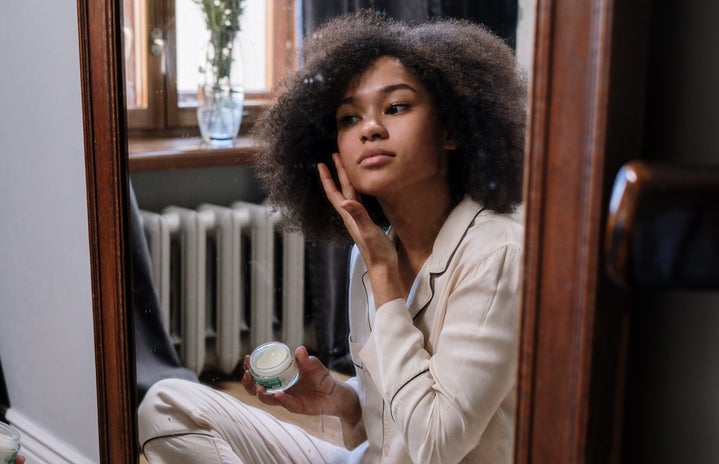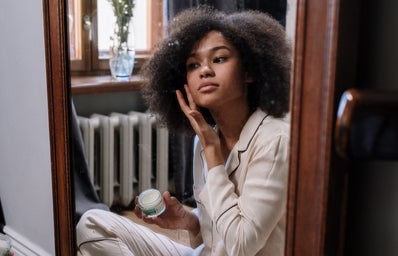In celebration of Black History Month, here are ten Black and woman-owned skincare and beauty brands to support.
- Hyper Skin (@gethyperskin on Instagram)
-
After noticing the lack of diversity in skincare brands, Desiree Verdejo, founder of Hyper Skin, created this multiculturalism-rooted brand to treat acne, dark spots, and hyperpigmentation on all skin tones while simultaneously enhancing the skin’s glow.
Support here: https://gethyperskin.com/
- Klur (@klur.co on Instagram)
-
Esthetician Lesley Thornton founded Klur “to cultivate a brand that reflected the values of clean, ethical and inclusive beauty.” This independent, self-funded, woman-owned and operated skincare company utilizes skin-barrier-strengthening vitamins in their products for long-lasting hydration.
Support here: https://klur.co/
- Beauty Bakerie (@beautybakeriemakeup on Instagram)
-
Cashmere Nicole founded Beauty Bakerie to develop cruelty-free, all-inclusive cosmetics. The brand is also known as “activists in makeup” for being vocal about a variety of injustices and disparities.
Support here: https://www.beautybakerie.com/
- Dehiya Beauty (@dehiyabeauty on Instagram)
-
Inspired by the Queen of the Amazigh (“free people”), Dehiya Beauty came to be. Dehiya was a fearless female warrior who led her people in the resistance against colonization in the 8th century. Dehiya Beauty aligns itself with this message of empowerment and is a champion of diverse and inclusive beauty. All of its 100% natural, global ingredients are plant-based and ethically sourced. The founder and creative director, Dr. Mia Chae Reddy, also donates a portion of Dehiya Beauty’s profits annually to organizations furthering women’s equality, racial justice, and human rights.
Support here: https://dehiyabeauty.com/
- Essentials By Temi (@essentialsbytemi on Instagram)
-
Essentials By Temi was founded by Temi Shobowale who is passionate about beauty and philanthropy. She fused these passions and created a skincare line, which is inclusive, plant-based, cruelty-free and dedicated to keeping its carbon footprint low through the use of reusable, recyclable, and sustainable packaging.
Support here: https://www.essentialsbytemi.com/
- Range Beauty (@range_beauty on Instagram)
-
Alicia Scott was tired of feeling left out when her complexion was not represented in makeup and founded Range Beauty “to ensure the Forgotten Shades are always remembered.” Her website says that “people of color are exposed to twice the amount of toxic beauty products with few clean alternatives,” inspiring her to create a line of beauty products which is diverse and clean. Range Beauty products are eczema and acne friendly and are made with vegan, cruelty-free, fragrance-free, talc-free, sulfate, and paraben free ingredients.
Support here: https://rangebeauty.com/
- Uoma Beauty (@uomabeauty on Instagram)
-
Sharon Chuter founded her makeup brand Uoma, which means beautiful, “to create a world of beauty that truly is for all of us.” Uoma is cruelty-free and has 51 foundation shades!
Support here: https://uomabeauty.com/
- Lamik Beauty (@lamikbeauty on Instagram)
-
Kim Roxie founded her vegan makeup line, Lamik Beauty, because she wanted to create “clean color cosmetics for women who historically have been marketed more toxic makeup options than their counterparts, women of color.” Lamik is an acronym for “Love And Makeup In Kindness,” which demonstrates the brand’s commitment to kindness to people and the planet.
Support here: https://lamikbeauty.com/
- Epara (@eparaskincare on Instagram)
-
Epara, which means to cocoon oneself in the Nigerian dialect Ebira, was founded by Ozohu Adoh. This luxury skincare for women, which focuses on hyperpigmentation and hydration, uses the best in highest quality African botanicals with ethical sourcing.
Support here: https://www.eparaskincare.com/
- Pholk Beauty (@pholkbeauty on Instagram)
-
Vegan skincare expert and former African Diaspora historian, Niambi Cacchioli, wanted to create a skincare regimen that was easy, effective, and affordable with her brand, Pholk Beauty.
Support here: https://pholkbeauty.com/
“Black people are less likely to have access to capital to fund their businesses, so it’s critical non-POC support them because these purchases can make a major impact on the potential growth,” Lesely Thornton, founder of Klur, told Vogue. “It’s small actions like supporting Black-owned beauty brands that help level the capitalist playing field for us.” Support black-owned businesses to help close the racial wealth gap, create jobs, and build up communities.


